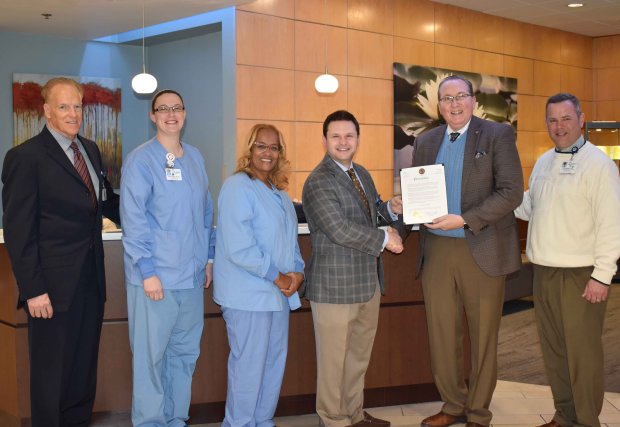Aiken Mayor Recognizes Certified Registered Nurse Anesthetists

Aiken Mayor Rick Osbon (second from right) proclaims January 20-27 as National CRNA Week across the city of Aiken.
Certified Registered Nurse Anesthetists (CRNAs) from Aiken Regional Medical Centers joined thousands of their colleagues from across the country to celebrate the 21st annual National CRNA Week, January 19–25, 2020.
Aiken Mayor Rick Osbon proclaimed January 20–27 as National CRNA Week across the City of Aiken. “In the city of Aiken we are excited to join other communities in recognizing the substantial contribution of Certified Registered Nurse Anesthetists to the healthcare field,” said Osbon. “These dedicated and committed individuals provide comfort to us and loved ones in the times we need it most. Aiken is blessed to have CRNAs who are professional, courteous and caring. Thank you for your service to our city!”
“As CRNAs, we administer anesthesia to patients undergoing orthopedic, cardiac, urologic, ENT, neurological, podiatry, GYN, and labor and delivery procedures, just to name a few," said Jeffrey Boswell, Chief CRNA at Aiken Regional Medical Centers. "Nurse Anesthetists apply the same high standards of care, regardless of the type of procedure and the setting in which the anesthesia is delivered. It is a privilege to be part of a profession that is so dedicated to advancing anesthesia patient safety and ensuring that patients have access to surgical, obstetrical, emergency, and pain management care, especially in rural and other medically underserved areas of our nation.”
Learn about nursing careers at Aiken Regional Medical Centers.
With a history spanning more than 150 years, CRNAs stay with their patients throughout their procedure, administering anesthetics and monitoring vital signs. Each year CRNAs ensure that millions of patients receive the safest anesthesia care possible.
CRNAs are advanced practice registered nurses who safely administer more than 49 million anesthetics in the United States each year. As the primary hands-on provider of anesthesia care in both civilian and military healthcare settings, CRNAs practice in every type of facility where anesthesia is required for patient care. That includes, but is not limited to, hospital operating and delivery rooms; ambulatory surgical centers; the offices of dentists, podiatrists, ophthalmologists, and plastic surgeons; pain management centers; and all U.S. Military service branches, Public Health Services, and Department of Veterans Affairs medical facilities.
National CRNA Week was established by the American Association of Nurse Anesthetists (AANA) to encourage CRNAs to educate the public about anesthesia safety, questions to ask prior to undergoing surgery, and the benefits of receiving anesthesia care from a nurse anesthetist.
About the South Carolina Association of Nurse Anesthetists (S.C.A.N.A.)
The South Carolina Association of Nurse Anesthetists was founded to promote continuing education among CRNAs in South Carolina. The first meeting of S.C.A.N.A. was held on April 14, 1951. It was attended by 11 Certified Nurse Anesthetists. The mission of the South Carolina Association of Nurse Anesthetists exists to support members and the profession through education, patient advocacy, practice, and public knowledge. The Association promotes high quality, effective, and safe care by providing professional development at the state and national level. The Association is committed to facilitating unencumbered access to quality anesthesia care for all citizens of South Carolina.
About the American Association of Nurse Anesthetists
Founded in 1931 and located in Park Ridge, Ill., the AANA is the professional organization for the nation’s nearly 54,000 CRNAs and student registered nurse anesthetists. The AANA advances patient safety and the CRNA profession through excellence in practice and service to members. As anesthesia professionals, CRNAs safely administer more than 49 million anesthetics to patients each year.
